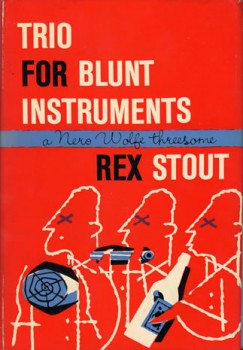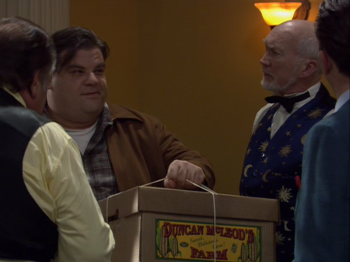Nero Wolfe’s Brownstone: 3 Good Reasons – Murder is Corny
 Alas – the home front is a bit…chaotic, with my wife halfway around the world on a mission and trip and the eleven-year old still needing school transportation – among other things. I didn’t get to finish editing this week’s A (Black) Gat in the Hand post – so, here’s the second entry in a feature which I hope will be part of a Nero Wolfe column next year. You can read my first try, covering “Not Quite Dead Enough.”
Alas – the home front is a bit…chaotic, with my wife halfway around the world on a mission and trip and the eleven-year old still needing school transportation – among other things. I didn’t get to finish editing this week’s A (Black) Gat in the Hand post – so, here’s the second entry in a feature which I hope will be part of a Nero Wolfe column next year. You can read my first try, covering “Not Quite Dead Enough.”
With a goal of eventually tackling every tale of the Corpus, I’ll give three reasons why the particular story at hand is the best Nero Wolfe of them all. Since I’m writing over seventy ‘Best Story’ essays, the point isn’t actually to pick one – just to point out some of what is good in every adventure featuring Wolfe and Archie (BTW – I got the idea from Hither Came Conan from this Wolfe series!). And I’ll toss in one reason it’s not the best story. Now – These essays will contain SPOILERS. You have been warned!
The Story
Today’s story is “Murder is Corny,” from Trio for Blunt Instruments. Nero Wolfe is upset because the weekly delivery of fresh corn is late. It finally arrives in the hands of Inspector Cramer, who got it from the scene of the murder of the delivery man. Archie had had a few dates with Susan McLeod, the farmer’s daughter, and she has unintentionally framed him for murder. Cramer arrests Archie, and to preserve his comfort level, Wolfe takes on the case, with Archie as his client.
3 GOOD REASONS
ONE – The Corn
This story contains one of my favorite openings. Every Tuesday, from July 20 to October 5, sixteen ears of just-picked corn are delivered to the brownstone from the farm of Duncan McLeod. Wolfe, of course, is very particular about the corn, including the requirements that it must be picked not more than three hours before he receives it, and that it must arrive between 5:30 and 6:30. Fritz prepares all of it for that evening’s dinner. But on this September Tuesday, the corn never arrives and Fritz has to make do with stuffed eggplant. Oh, the horror!
Wolfe is out of sorts and doesn’t engage Archie in their usual post-dinner conversation, over coffee in the office. He is standing at the giant globe, whirling it and scowling at it. This is unwarranted physical exertion on Wolfe’s part!
Inspector Cramer rings the doorbell and is admitted, carrying a carton with Wolfe’s name on it. He marches down the hall, deposits it on Wolfe’s desk and cuts the cord around the box. As Wolfe comes over to his desk, Cramer opens the flaps, holds up an ear of corn and says, “If you were going to have this for dinner, I guess it’s too late.”
As Wolfe settles his bulk into the only chair truly made for him, Cramer reveals that McLeod’s delivery man, Kenneth Faber, was found dead. His head was caved in with an iron pipe, in the alley in back of Rusterman’s Restaurant.
Wolfe, focused on the corn, not Cramer’s story, begins shucking it. He ends up with three piles; two ears are too young, six are too old, and eight are just right.
(This porridge is too hot! This porridge is too cold!)
Cramer is frustrated and Wolfe gives him a soliloquy on sweet corn. It’s fantastic!
“So you eat sweet corn?”
“Yes. You’re stalling.”
“No. Who cooks it?”
“My wife. I haven’t got a Fritz” (THAT is fantastic!)
“Does she cook it in water?”
“Sure. Is yours cooked in beer?”
(Wolfe’s expounding could have come from Too Many Cooks.)
“No. Millions of American women, and some men, commit that outrage every summer day. They are turning a superb treat into mere provender. Shucked, and boiled in water, sweet corn is edible and nutritious; roasted in the husk in the hottest possible oven for forty minutes, shucked at the table, and buttered and salted, nothing else it is ambrosia. No chef’s ingenuity and imagination have ever created a finer dish. American women should themselves be boiled in water. Ideally the corn –“
“How much longer are you going to stall?”
“I’m not stalling. Ideally, the corn should go straight from the stalk to the oven, but that’s impractical for city dwellers. If it’s picked at the right stage of development it is still a treat for the palate after twenty-four hours, or even forty-eight; I haven’t tried it…”
Wolfe then points out that farmer McLeod knows better than to send him crappy corn. He doesn’t use such a vulgar word, of course. Cramer, not without justification, arrests Archie as a material witness. The exchange between Wolfe and Cramer to end this scene is a fitting capstone to some of Stout’s best writing in the series.
This story was adapted as part of the A&E Nero Wolfe Mysteries, starring Maury Chaykin and Timothy Hutton. It’s an excellent episode, and they did a fantastic job with the opening.
In the story, when Archie approached the front door, he intended to leave the chain on and tell Cramer, “Deliveries in the rear.” He simply opens the door, however. But in the A&E series, he does deliver that line, and it’s perfect. The facial expressions, body language and tones of voice between Cramer (Bill Smitrovich) and Wolfe are a joy to watch.
TWO – The Suitors
 There’s a notebook on Farber’s body. It included a list with four names. The first three were checked off: Max Maslow, Peter Jay, and Carl Heydt. The fourth, Archie’s was not. The three men are would-be suitors of McLeod. They have a few scenes and they provide some entertainment, in addition to some general information.
There’s a notebook on Farber’s body. It included a list with four names. The first three were checked off: Max Maslow, Peter Jay, and Carl Heydt. The fourth, Archie’s was not. The three men are would-be suitors of McLeod. They have a few scenes and they provide some entertainment, in addition to some general information.
Wolfe interviews them in the office, and they are interruptive, somewhat aggressive and not particularly helpful. Maslow insults Jay (or so Jay feels), and the latter starts a fight. Not much of one, though. While Jay is throwing a slow punch at Maslow’s jaw, Maslow lands a punishing kidney punch (Archie’s own best shot). As Jay began to fold up, Maslow repeated the blow and Jay went down. Maslow sat back down as Archie helped Jay back into his chair.
They are uncooperative, and Wolfe tells them he may have no other option than to turn the police’s attention to Susan McLeod, in order to get Archie out from under. They call his bluff and leave. Cramer comes the next day and Wolfe carries through on his threat. Susan McLeod is arrested. The trio comes back to the brownstone and with Archie in tow, they go to Jay’s apartment.
At the end of the discussion, Jay and Maslow decide to rough up Archie. Archie puts Jay out of commission but barely avoids being taken out by Maslow, before getting the better of him.
The three characters, as losers to Archie in vying For Susan’s affections, definitely enhance the story.
The A&E episode has this confrontation taking place inside the front entry of the Brownstone. However, while it’s serious in the story, it’s played for comedy on television. Archie has a cup of coffee in his left hand when the rough stuff starts and he handles all three of them and pushes them outside without spilling a drop. It’s fun to watch.
THREE – Wolfe & Punishment. And Justice?
There are instances in the Corpus (the title given to the collection of Stout’s original Wolfe stories – pastiches not included), where Wolfe arranges matters so that the villain takes their own life. Or, perhaps more accurately makes it clear that the net is being drawn and things are about to get very, very bad for them. Sometimes it’s through written communications (read on), sometimes through circumstances, and sometimes it’s directly through conversation (“Booby Trap.”). He has even arranged a lethal trap (“Black Orchids”). That topic is probably worth an entire essay.
McLeod had earlier explained the reason shoddy corn was sent to Wolfe, and Rusterman’s (and presumably, everyone else). He had a man coming with a bulldozer to help clear a lot on his farm. But when the man said he had to come a day earlier than planned, McLeod had to adjust his schedule to dynamite some rocks and stumps first. He let Kenneth Faber pick the corn. And his helper did a terrible job.
 The following Tuesday, Wolfe comes down early from his afternoon plant room session, which is unheard of. He asks if the corn has arrived: something had occurred to him. As Archie replies, the doorbell rings. Wolfe actually takes the corn from the delivery man and carried it to his desk! He then calls Inspector Cramer and tells him that it may be a dynamite bomb. The bomb squad confirms that it is. So, the dynamite motif is established.
The following Tuesday, Wolfe comes down early from his afternoon plant room session, which is unheard of. He asks if the corn has arrived: something had occurred to him. As Archie replies, the doorbell rings. Wolfe actually takes the corn from the delivery man and carried it to his desk! He then calls Inspector Cramer and tells him that it may be a dynamite bomb. The bomb squad confirms that it is. So, the dynamite motif is established.
In this case, Wolfe has Saul Panzer deliver a memorandum to Duncan McLeod on what turns out to bet the final morning of the story. Wolfe tells McLeod that he “should have in readiness, acceptable answers to the following questions if and when they are asked:” There followed five questions as samples. And those questions make it clear that Wolfe knows he killed Kenneth Faber; and why.
Wolfe opens the bag for Cramer, who then dispatches men to capture the dangerous McLeod. The Inspector is not thrilled with Wolfe: “So you decided to share your interpretation with him instead of me.” And, “So you deliberately warned a murderer. Telling him to have his answers ready. Nuts…”
Bu when the authorities arrive, they find that the farmer has committed suicide; by blowing himself up with dynamite! McLeod, seeing no way out, killed himself with the same weapon which he attempted to murder Wolfe.
I don’t believe that most of us would have the massive ego required to push someone to kill themselves. Especially if we had a working relationship with the police. While I don’t think this quite matches up with Wolfe’s actions towards John Bell Shattuck, Wolfe clearly followed his own path to justice in this case.
ONE BAD REASON
Archie Doesn’t Do Much
So: what did Archie do to earn his pay in this one? In chapter one, he talks to Cramer about knowing Susan McLeod, and gets arrested. In chapter two, he finds out that Susan has effectively framed him for murdering Kenneth Faber. That’s it.
In chapter three, he takes Wolfe’s order to type up a long report of the Brownstone conversation with Susan. He does it off page. In chapter four, the mostly watches as Wolfe questions the three suitors. Then he lets Cramer use his phone to call for the arrest of Susan McLeod.
In chapter five, he does meet with the three suitors and subdues two of them in a fight. He also accepts a package of corn that contains a dynamite bomb. Only a possibility occurring to Wolfe saves Archie – and likely Fritz.
And, he listens to Wolfe and Cramer, and watches the bomb squad remove the rigged carton of corn, in chapter six.
In this story, Archie has some witty lines, engages in a little physical stuff, has a fun scene with Susan McLeod, and more. Don’t get me wrong: it is a better story for his presence in it. But it’s even Saul that delivers the questions to farmer McLeod, which bring the case to its explosive conclusion. Wolfe could have solved the case without Archie. Archie’s eye for the ladies is the indirect reason for this case. But that’s certainly not a contribution. In fact, since he’s a client (it becomes a joint affair with Wolfe), presumably it was pro bon.
I don’t think Wolfe appreciated Archie too much over this one!
MISCSELLANEA
1964’s Trio For Blunt Instruments also includes “Kill Now – Pay Later” (1961 – Saturday Evening Post), and “Blood Will Tell” (1964 – Ellery Queen’s Mystery Magazine). “Murder Is Corny” made its first appearance in this collection.
Wolfe reads Bruce Catton’s book on the Civil War, The Coming Fury. It was followed by Terrible Swift Sword and Never Call Retreat. The trilogy is titled The Centennial History of the Civil War. It’s an excellent read, though as I recall, I think I preferred his Army of the Potomac Trilogy (Mr. Lincoln’s Army, Glory Road, and A Stillness at Appomattox. Catton was a world-class Civil War historian and a must-read in the field.
“Kill Now – Pay Later” is not one of my favorites in the Corpus. “Blood Will Tell” is ‘meh.’ Neither story will be appearing in this series in the near future.
The A&E adaptation of this story is as good as any in the entire series.
YOU DON’T SAY
Wolfe – “Mr. Cramer. Knowing your considerable talents as I do, I am sometimes dumbfounded by your fatuity. You were so bent on baiting Mr. Goodwin that you completely ignored the point I was at pains to make.”
He pointed at the piles on his desk.
Wolfe – “Who picked that corn? Pfui!”
Cramer – “That’s your point,” Cramer rasped. “Mine is who killed Kenneth Faber. Move, Goodwin.
This is the end of the scene which included the speech on the proper way to cook sweet corn. It’s classic Stout.
Cramer – “When and how did you find out that Kenneth Faber had shoved you out and taken Sue over?”
Archie – “Nuts.” I turned to Wolfe. “Your Honor, I object to the question on the ground that it is insulting, impertinent, and digusticulous. It assumes not only that I am shovable, but also that I can be shoved out of a place I have never been.”
Wolfe – “Objection sustained.” A corner of Wolfe’s mouth went up a little. “You will rephrase the question, Mr. Cramer.”
Cramer – “The hell I will.”
(Upon Archie’s return to the Brownstone after spending the night at Police headquarters and the District Attorney’s Office)
Wolfe – “Have you eaten?”
Archie – “If you could see the bacon and eggs they had brought in for me and I paid two bucks for, let alone taste it, you’d never be the same.”
(Timothy Hutton’s world-weariness in this scene is excellent. It really is a fine episode.)
Cramer – “By God. Talk about stubborn egos.” Cramer shook his head. “That break you got on the carton. You know, any normal man, if he got a break like that, coming down just in the nick of time, what any normal man would do, he would go down on his knees and thank God. Do you know what you’ll do? You’ll thank you. I admit, it would be a job for you to get down on your knees, but –”
PRIOR NERO WOLFE POSTS
The Public Life of Sherlock Holmes
Meet Nero Wolfe
The R-Rated Nero Wolfe
Radio & Screen Wolfe
A&E’s ‘A Nero Wolfe Mystery’
A Sidney Greenstreet Nero Wolfe Pastiche – ‘Stamped for Murder’
Nero Wolfe’s Brownstone
 Bob Byrne’s ‘A (Black) Gat in the Hand’ was a regular Monday morning hardboiled pulp column from May through December, 2018 and was brought back in the summer of 2019.
Bob Byrne’s ‘A (Black) Gat in the Hand’ was a regular Monday morning hardboiled pulp column from May through December, 2018 and was brought back in the summer of 2019.
His ‘The Public Life of Sherlock Holmes’ column ran every Monday morning at Black Gate from March, 2014 through March, 2017 (still making an occasional return appearance!).
He organized ‘Hither Came Conan,’ as well as Black Gate’s award-nominated ‘Discovering Robert E. Howard’ series.
He is a member of the Praed Street Irregulars, founded www.SolarPons.com (the only website dedicated to the ‘Sherlock Holmes of Praed Street’) and blogs about Holmes and other mystery matters at Almost Holmes.
He has contributed stories to The MX Book of New Sherlock Holmes Stories – Parts III, IV, V and VI.
Thanks for a great post, Mr. Byrne.
Stout’s Nero Wolfe isn’t for everyone; his stories are extremely New York-centric and the author deliberately constructed his tales to maximize their appeal to a specific audience: the elites of the entertainment world that lived in or passed through NYC. When Stout created Wolfe in Fer-de-Lance, New York was an intersection for the worlds of Radio, Film, Stage and Publishing to a degree not seen today. Stout was a part of that world and crafted his stories with those people in mind; it is a tribute to his skill as a writer that in doing so, he created not one but two immortal characters (at least).
When that A&E show first came out, I was disappointed that their budget required they use the same actors in different roles, but everyone is so good and having such a great time with the material, that it is still a joy to watch. I have to admit that when you mentioned the characters in the story, the images that spring to mind are from the Nero Wolfe Mysteries episode.
Thanks again.
Always happy to see comments from fellow fans of the Corpus. I know some folks don’t like the ensemble approach of the A&E series, but I’m fine with it.
The show is actually what led me to read the stories. I came to Wolfe VERY late.
I actually have hopes of a weekly Wolfe column here – for a half or full year. This post was to be one of them.
I think my ambition is greater than my capacity, but I think there will be a Wolfe series here in the next year or two.
As much as I know and write about Sherlock Holmes and Solar Pons, Wolfe and Archie are my favorite detectives!
Thank God I’ll never have to choose between them, I can read them all. That reminds me, I have to read more Solar Pons. It’s been too long.
Always glad to see a NW post, and would love to see a series on him(them). I own the entire Corpus (twice, ebook and tree book) and reread them regularly. Yes, it is New York-centric, as McGee is Florida-centric, Spenser is Boston-centric, Archer is Southern California-centric just to name three. After all, these are PIs, not members of the Secret Service. I would call it a feature, not a bug.
It isn’t that the books are centered around A location (Spenser/Boston, McGee/Florida, Holmes/London, even de Grandin/central NJ seem to work just fine), it’s that the location is New York, NY.
Some people just seem to find the Big Apple off-putting.